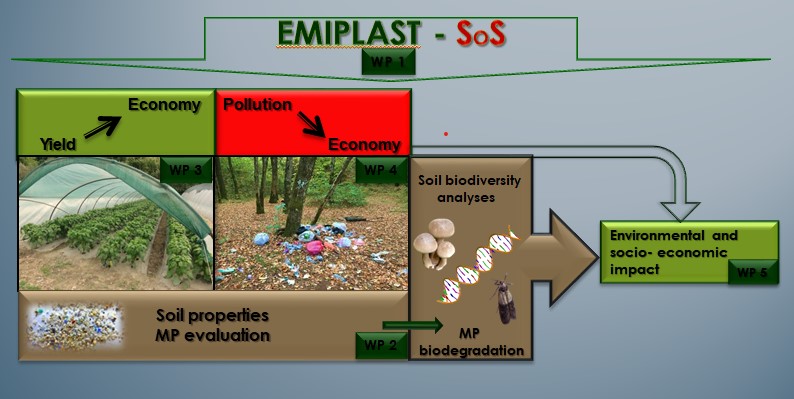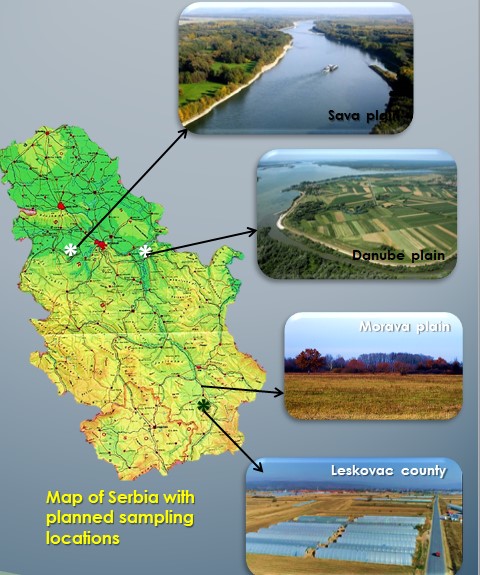

+381(11)3555258
office@imsi.bg.ac.rs
Evaluation of the Microplastic in the Soils of Serbia EMIPLAST-SoS is the new project where IMSI is the leading contractor and has been financed by Scientific Fund of Serbia through the progrmae IDEAS, grant number 7742318. The project was authored by Reserach Proffesor Dr Žaklina Marjanović and coordinated by Research Associate Proffesor Dr Slobodan Krnjajić who formed very enthusiastic team.
We have set ambitious goals in order to provide first insights on the influence of microplastic (MP) on the ecosystem services of the soils and biological communities in alluvial plains of Serbia.
The multidisciplinary approach and team that covers different aspect of the problem will be included in fulfilling following objectives:

Concept and methodology
MP biodegradation capacity of fungi and insects, actual characterized soil MP isolates will be added to the growing media of selected species of autochthonous insects and fungi in the controlled conditions. After certain time points, the change in MP amounts/size will be reevaluated.
Enzymes that could be involved in plastic polymers degradation (laccases, different peroxidases, lipases etc.), as well as products of degradation will be characterized using spectrophotometry and HPLC based methods.
Main field experiment

In situ exploration – analyses of soil characteristics, biodiversity of representative soil organism communities, as well as potential impact of plasticulture and MP amendment on selected crops yield.
Soil analyses
Soil properties that may influence aggregate stability will be evaluated – pH, electrical conductivity, content of total carbon, and nutritive status of soil (N, P2O5, K2O; Cu, Zn, Mn and CaCO3).
Biodiversity studies
PCR amplification of fungal ITS (Internal Transcribed Space) followed by NGS sequencing for evaluation of soil communities.
Data
MP presence in the soils will be the first such data recorded in Serbia and Balkan Peninsula, rare even on the European/global level.
It will enable comparison with other regions in global attempt for solving serious problem of pollution originating from plastic materials.
Project implementation will be stored in public soil biodiversity database EDAPHOBASE (https://portal.edaphobase.org/)
Ambition
This is the first attempt to evaluate the influence of MP on soil biodiversity and services of forest ecosystems, or compare its evaluation with agroecosystems on the same soil type/climate on the global level.
First time biodegradation potentials of selected autochthonous fungi and insects will be examined using exact MP material isolated from soil (on the global level).
The intended protocol for MP evaluation in this proposal should enable easy monitoring of MP pollution in soils in general and providing state of art solutions for this global environmental, social and economic problem.
Credentials of PI and members of Project team
The EMIPLAST-SoS project team was newly formed by people from 4 different institutions in order to cover necessary expertise and resources for reaching the project objectives.
The experiments settled in IMSI and IZZ, institutions with the most developed research infrastructure.
Strong points of credentials of the PI and the members of the Project team.
PI, Dr Slobodan Krnjajić (PhD in Entomology)
P1, Dr Žaklina Marjanović (MSc in Environmental Sciences, PhD in Molecular Eco-physiology of Plant/Fungal Interactions)
P2, Dr Vesela Radović (MSc in Hydrogeology, PhD in Safety and Security Sciences)
P3, Dr Elmira Saljnikov (MSc, PhD in Soil Sciences)
P4, Dr Slađan Stanković (MSc in Agriculture (Plant protection / Entomology, PhD in Ecology)
P5. Dr Vedran Tomić (PhD Agroeconomy)
P6, MSc Slobodan Stefanović (MSc in Biology)
P7, MSc Goran Knežević (MSc in Environmental Sciences)
P8, MSc Tara Grujić (MSc in ecological engineering in soil and water resources)
University of Belgrade
Institute for Multidisciplinary Research
Kneza Višeslava 1, 11030 Beograd
(+381) 11 3555-258